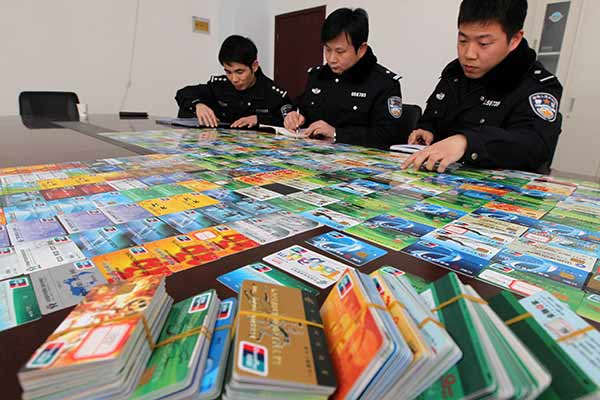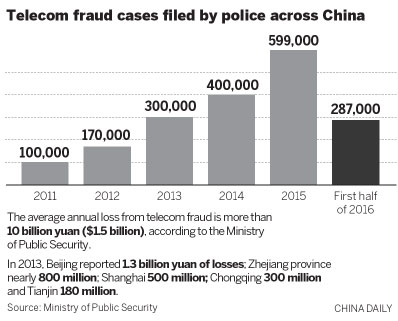Telecom fraud blamed in death of college applicant
Updated: 2016-08-26 07:12
By ZHAO RUIXUE(China Daily)
|
|||||||||
 |
|
Police officers make a list of bank cards seized in a telecommunication fraud case in Xuchang, Henan province, in January. NIU YUAN/CHINA DAILY |
Students' information is easily collected and sold to scammers who prey on trusting people
Xu Yuyu, a college-bound student, died from a sudden heart attack on Sunday after tuition fees raised by her family were swindled in a telephone scam.
The 18-year-old from Linyi, Shandong province, scored 568 points on her college entrance exam this year and was admitted to Nanjing University of Posts and Telecommunications.
On Aug 19, she received a phone call notifying her that she was due to receive 2,600 yuan ($390) in student funding. She had received an official phone call from the education authority the day before, so she did not question the authenticity of the second call.
Xu wired a 9,900-yuan "activation fee" into the scammer's bank account, hoping the money would appear in her student account, but it never did.
Xu was said to be devastated and fainted on the way back home from reporting the case to police.
Despite doctors' efforts to revive her, she died. According to reports, Xu was healthy.
Xu's family is poor and had to save for almost a year and borrow from relatives to put aside their daughter's tuition.
"We are already so poor. Why did they swindle us?" Li Ziyun, Xu's mother, recalled Xu asking.
"She never misspent her money and always saved what little she had," said Li.
Xu Lianbin, Xu's father, regretted taking his daughter to the police station the day of the swindle.
"If I took her to the police station even one day later, she might have been calm and she wouldn't have died," Xu said.
Staff at the Nanjing University of Posts and Telecommunications told the Linyi police on Wednesday that the school didn't contact Xu, except for issuing an admission letter to her. The school expressed sympathy to Xu's family.
"Information about safety education, including how to avoid fraud, are in the admission notices, which each freshman gets along with the admission letter," said Xu Lei, director of the publicity department at the university.
On the same day that Xu encountered the telephone scam, Li Xiaqin, a sophomore at Shandong Agriculture and Engineering University, also received a call, this one informing her that she was involved in a case of money laundering and needed to transfer money to prove her innocence.
Li, also from Linyi, wired 6,800 yuan to the bank account provided by the caller.
The Ministry of Education reminded students on Wednesday about frauds involving student funding. The ministry said any organization or person funding students does not ask students to make any transactions through ATMs or online. Students were advised to first confirm any payments with teachers and the local education authority.
According to an agent who provides student information, such information is easily collected and can be sold for as low as one fen (one-sixth of a cent) per student, Qilu Evening News reports.
"I frequently receive calls from strangers promoting their products. I am really puzzled over who released my information," said Yu, a resident of Jinan, Shandong province who only gave his family name.
Yu said he once received a phone call asking whether he'd like to send his 3-year-old daughter to a class that trains future movie stars.
"I just handed in materials to the kindergarten for my daughter in the morning. Then I got the call in the afternoon," said Yu.
Shi Xinmin, a police officer at the Shizhong district police station in Jinan, said, "These scammers clearly target their victims. It seems they know what you care about."

Related Stories
Student suffers fatal cardiac arrest after telephone scam 2016-08-25 09:18
Ticket scam probe widens 2016-08-25 08:07
15,000 bogus bomb detectors made before global scam exposed 2016-08-09 07:45
Today's Top News
China rescue team rushes to Italy for earthquake relief
Poland: 1st European state to issue RMB debt in China
Italy rescuers toil as death toll hits nearly 250
More understanding among remaining EU states
At least 73 dead after strong quake strikes Italy
Turkey launch operation in north Syria to fight IS
UK manufacturing export orders highest in 2 years after Brexit vote
Paris tourism lost 750 mln euros after attacks
Hot Topics
Lunar probe , China growth forecasts, Emission rules get tougher, China seen through 'colored lens', International board,
Editor's Picks

|

|

|

|

|

|







